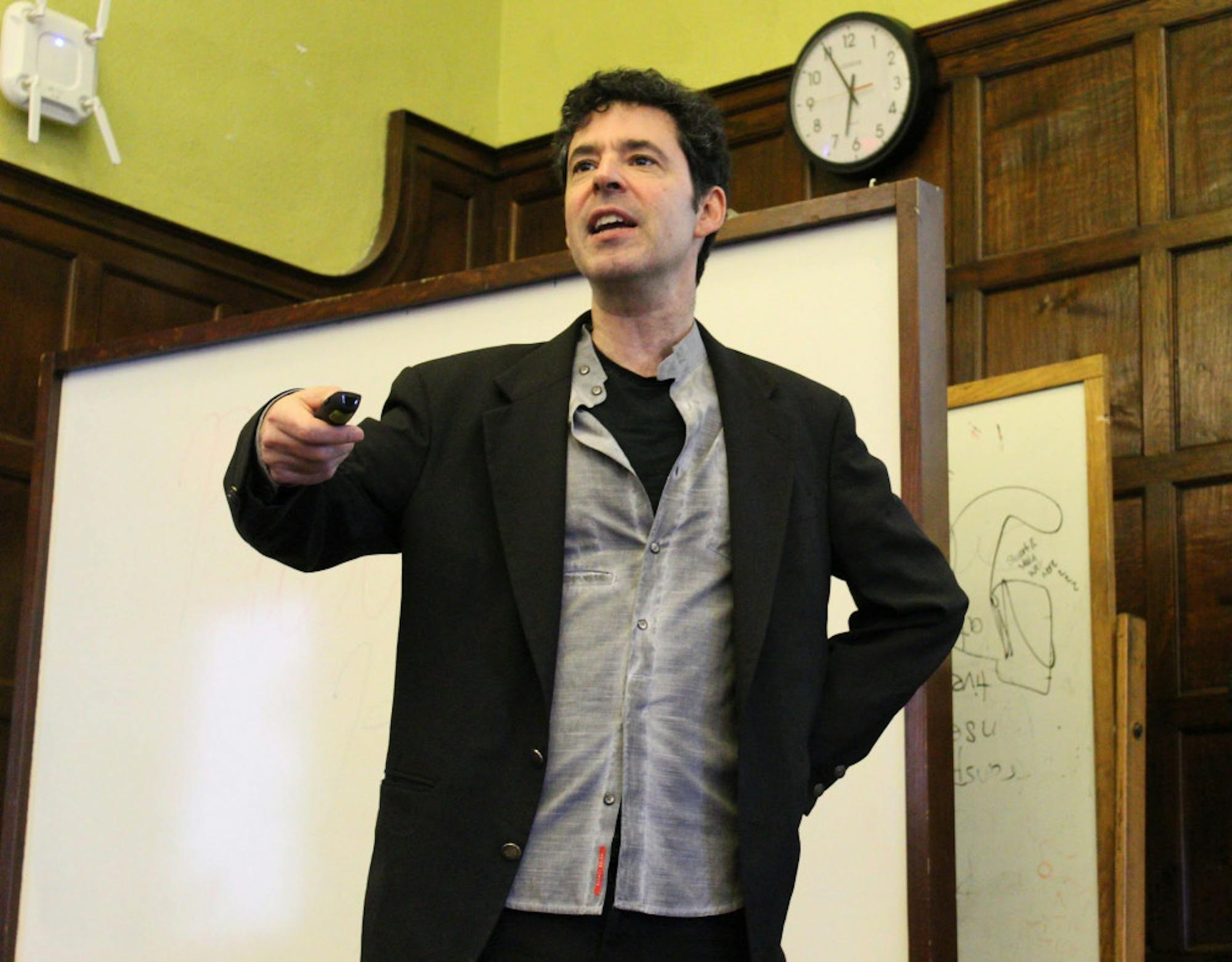Jason Stanley, the Jacob Urowsky Professor of Philosophy at Yale University, visited Tufts yesterday to speak with Annie Pfeifer’s class "Facism: Then and Now" and give a lecture through the Center for the Humanities at Tufts entitled "Ignorance in the Age of Information."Stanley is known for his scholarship surrounding the philosophy of language and how language intersects with politics. His 2018 book, “How Fascism Works: The Politics of Us and Them,” was a New York Times Book Review Editor’s Choice. In an interview with the Daily, Stanley discussed politics as well as his upcoming book project "Hustle: The Philosophy of Language."
“[Hannah] Arendt talks about how fascist ... totalitarian propaganda ... one feature about it is that it creates the reality that it then feeds off of. That it goes along with empire in general," Stanley said. "That idea of creating the reality your politics represents, so if you have ... racial politics, you would try to create a reality that reflected [that]."
Stanley likens Trump to Nixon throughout his book. Throughout his discussion with Pfeifer's class, Stanley said that he intended for "How Fascism Works" to demonstrate how fascism has existed in the United States, and that he wanted to demonstrate that fascism is not just a European phenomenon.
Discussing how the U.S. should address its own history, Stanley emphasized the importance of looking at the dynamics of teaching U.S. history to white-nationalist and right-wing audiences.
"The sort of more tricky position is the one that says 'Oh, you know that was what people did back then, that wasn’t really the point,' that denies the centrality of slavery for instance in the United States," Stanley said in an interview. "That denies the scope of the problem of mass incarceration today, which I think is the same anti-black ideology just reemerging in a different form that tries to justify what statistically anyone could look at say that’s unjustifiable.”
Stanley elaborated on mass incarceration in the U.S., discussing the fates of formerly incarcerated African Americans.
“We have this system of racial apartheid where past is never past," he said. "If you just look at the difference, prisons create a permanent underclass.”
Stanley also expanded and challenged postmodern notions of truth and the ways that contemporary fascists define truth. Stanley defined standpoint epistemology as well and described how it relates to white nationalists.
"That’s [standpoint-epistemology] saying that it’s really hard to know the truth, and to know the truth you need to be situated in the right position," he said. "What I think right nationalists want to say is not [that] there’s only one truth, the truth of the dominant group, the experience of the dominant group ... The fact is it might have been great for you, but it was really terrible for other people.”
A chapter of "How Fascism Works" is devoted to universities, and primarily deals with right-wing speakers on campus. Stanley addressed this in the interview, advocating for right-wing speakers in the right context.
“It’s a political war," Stanley said. "Genuine right-wing conservative speakers have a place on campus, an important place on campus, a voice to be heard, and there’s a lot of money for such speakers and a lot of support for them, and I’m glad they do speak. But when people speak just to provoke, to create fodder for the press that they can then use so the government can clamp down on universities in a authoritarian fashion, then I think we have a problem. It’s been planned from the beginning.”
Stanley also discussed his new book and the subject of his lecture, "Ignorance in the Age of Information," and the ways he is contributing to linguistic theory.
“The talk is coming from my new book project with Princeton University Press, where I’m trying to bring together insights that I think humanities scholars know about language, that language is not just there for communication," Stanley said. "So it’s a mixed science and humanities talk, where I’m going to be talking about how we should recognize that language has these multiple purposes, to create [us-vs.-them] distinctions, to divide, as well as to communicate.”
Ava Dimond, a student in Pfeifer's course who attended the event, said she enjoyed it.
"I appreciate his commitment to exploring why people are attracted to fascism from many different angles, throughout history and in different places," Dimond, a first-year, said.
In "How Fascism Works," Stanley discusses the idea of "unreality" and how it relates to fascist ideology and policy. When asked about "unreality" and propaganda, Stanley stressed the importance of crafting realities that reflect those they serve.
“[Hannah] Arendt talks about how fascist ... totalitarian propaganda ... one feature about it is that it creates the reality that it then feeds off of. That it goes along with empire in general," Stanley said. "That idea of creating the reality your politics represents, so if you have ... racial politics, you would try to create a reality that reflected [that]."
Stanley likens Trump to Nixon throughout his book. Throughout his discussion with Pfeifer's class, Stanley said that he intended for "How Fascism Works" to demonstrate how fascism has existed in the United States, and that he wanted to demonstrate that fascism is not just a European phenomenon.
Discussing how the U.S. should address its own history, Stanley emphasized the importance of looking at the dynamics of teaching U.S. history to white-nationalist and right-wing audiences.
"The sort of more tricky position is the one that says 'Oh, you know that was what people did back then, that wasn’t really the point,' that denies the centrality of slavery for instance in the United States," Stanley said in an interview. "That denies the scope of the problem of mass incarceration today, which I think is the same anti-black ideology just reemerging in a different form that tries to justify what statistically anyone could look at say that’s unjustifiable.”
Stanley elaborated on mass incarceration in the U.S., discussing the fates of formerly incarcerated African Americans.
“We have this system of racial apartheid where past is never past," he said. "If you just look at the difference, prisons create a permanent underclass.”
Stanley also expanded and challenged postmodern notions of truth and the ways that contemporary fascists define truth. Stanley defined standpoint epistemology as well and described how it relates to white nationalists.
"That’s [standpoint-epistemology] saying that it’s really hard to know the truth, and to know the truth you need to be situated in the right position," he said. "What I think right nationalists want to say is not [that] there’s only one truth, the truth of the dominant group, the experience of the dominant group ... The fact is it might have been great for you, but it was really terrible for other people.”
A chapter of "How Fascism Works" is devoted to universities, and primarily deals with right-wing speakers on campus. Stanley addressed this in the interview, advocating for right-wing speakers in the right context.
“It’s a political war," Stanley said. "Genuine right-wing conservative speakers have a place on campus, an important place on campus, a voice to be heard, and there’s a lot of money for such speakers and a lot of support for them, and I’m glad they do speak. But when people speak just to provoke, to create fodder for the press that they can then use so the government can clamp down on universities in a authoritarian fashion, then I think we have a problem. It’s been planned from the beginning.”
Stanley also discussed his new book and the subject of his lecture, "Ignorance in the Age of Information," and the ways he is contributing to linguistic theory.
“The talk is coming from my new book project with Princeton University Press, where I’m trying to bring together insights that I think humanities scholars know about language, that language is not just there for communication," Stanley said. "So it’s a mixed science and humanities talk, where I’m going to be talking about how we should recognize that language has these multiple purposes, to create [us-vs.-them] distinctions, to divide, as well as to communicate.”
Ava Dimond, a student in Pfeifer's course who attended the event, said she enjoyed it.
"I appreciate his commitment to exploring why people are attracted to fascism from many different angles, throughout history and in different places," Dimond, a first-year, said.






